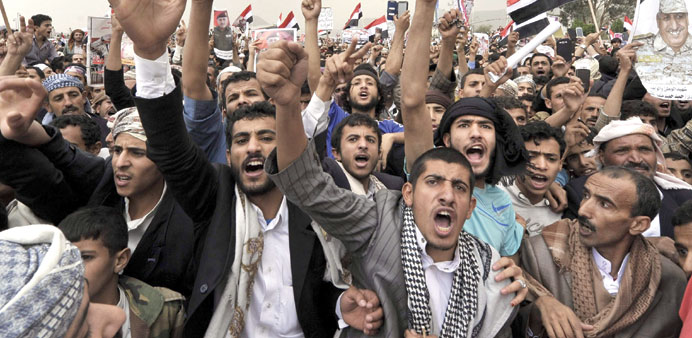|
Yemeni President Abd-Rabbu Mansour Hadi called yesterday for unity during a visit to the northern city of Amran, briefly seized by Shia rebels in clashes with government forces and loyal tribes. |
The capture on July 2 of Amran, just 50km north of Sanaa, by Houthi rebels threatened a federalisation plan that was agreed in February following national talks as part of a political transition.
The Houthis, also known as Ansarullah, pulled out few days later after reaching an agreement with the authorities, allowing government forces into the city.
“We have to turn a new page and realise that the age of conflicts and wars is over. Our homeland has suffered enough trouble over the past five decades,” Hadi said, addressing officials at the government complex in the city.
He called for “more cohesion and unity ... and to raise awareness of the danger of regional, sectarian and factious conflicts”, according to Saba state news agency.
The Houthis’ capture of the city was seen as part of a plan to push towards the capital and posed a challenge to the government which is also facing an Al Qaeda threat and a separatist movement in the south.
Houthis, who have been battling the central government for years, are suspected of trying to expand their sphere of influence as Yemen is reorganised into six regions.
They have repeatedly complained of marginalisation under former president Ali Abdullah Saleh, who ruled for 33 years before being forced out in February 2012.
He was replaced by Hadi, his long-time deputy, under a UN- and Gulf-sponsored deal.
In a sign of continuing instability elsewhere in Yemen, five government soldiers were killed when they confronted tribesmen trying to stop engineers repairing an oil pipeline blown up earlier this month, a local official said.
Tribesmen bombed the main oil export pipeline in the restive Maarib province in central Yemen on July 12, depriving the impoverished country of an important source of revenue.
Two tribesmen were killed in yesterday’s clash, the official said. “The army has instructions to open the road by force for the engineers, and the situation is tense,” he added.
The Maarib pipeline carries around 70,000-110,000 barrels per day of Marib light crude from Safer oilfields to Ras Isa oil terminal on the Red Sea, the official said. It was repaired in late May after a previous attack by tribesmen.

